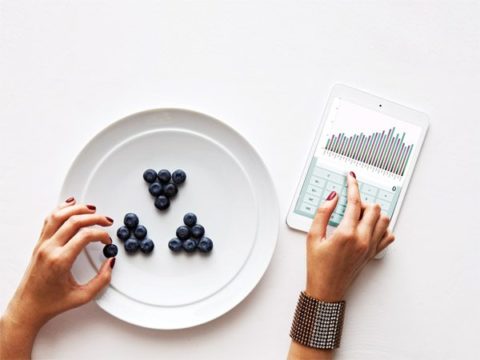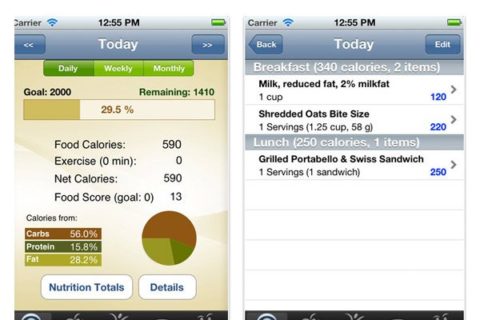Digital Diet: Are fitness and diet apps helpful or ushering in a new era of online shaming?


The current fitness landscape provides endless ways to track your every mouthful, workout and calorie burned. As Lisa Jeans knows, the outcome isn’t always healthy.
Sweaty and breathing hard, I pulled out my phone and opened MyFitnessPal. After morning Ashtanga yoga and a sunset run along the Vancouver Sea Wall, my “calories remaining” count was 1,000. I was ecstatic—I had burned more than I had eaten. An advisory in red letters popped up: “Based on your total calories consumed for today, you are eating too few calories.”
“I’ve been caught,” I thought. I may have started using the app to help me train for a 10k run, but I have struggled with an eating disorder in the past, and at times I fall back into the vortex of anorexic thinking.
Technology is democratizing the fitness industry. While you might not be able to work out with a celebrity trainer, you can sweat like Serena Williams (in theory) with the Nike Training Club app. Smartphone and tablet users have access to hundreds of custom get-fit programs, meal plans and activity monitors to keep them on track and provide a social media cheering section. But they have their limits. “An app is you working on this project by yourself,” says Dr. John Berardi, co-founder of Precision Nutrition, a health coaching company that has developed an online tool to help serve its clients—he calls the new paradigm Fitness 2.0. “You don’t get wisdom, you get information.”
For an app to work, you have to engage with it. “In the beginning, when you get to the end of the day and see you’re a couple of points short [of your goal], you’re doing jumping jacks in the living room,” says Berardi, who’s skeptical that most app users will maintain that vigilance. Elisa Smith*, 39, an Ottawa artist and consultant, lost weight using the app Calorie Counter for 10 months—until she went on vacation. “At some point, you reach a threshold of monitoring and you just want to eat,” she says. When she went “free range,” she started gaining weight, so she has been tracking on and off ever since.
Smith’s experience is backed up by psychological research: Self-control requires a goal, a motor and a conflict detector. “I can exercise and withhold eating—these are low-order goals that I set to meet my high-order goal, which is losing weight,” says Dr. Michael Inzlicht, associate professor of psychology at the University of Toronto Scarborough. “When what I’m doing is not in line with what I want to be doing, there should be some alarm bell going off.” That would be the brain’s anterior cingulate cortex, which makes you rethink your actions. “If you have chosen goals that are worthy, doing them for yourself alone, this cortical alarm bell is more likely to go off when you engage in behaviour that may put you at risk of failing.” As Inzlicht spoke, I had an epiphany: For me, thinness was linked to my high-order goal of becoming an actor. I so hungered for it that my brain’s alarm bell rang at the mere thought of food, keeping it off my plate and out of my body.
There are lots of toys to help you keep track of your behaviour and goals: Wristbands like Fitbit Flex measure how you sleep and move, while the Withings scale tracks weight, body composition and heart rate. They send data to your phone, and can tweet or post your results.
Fitness apps and websites tend to offer one of two disciplinary incentives: the carrot or the stick. Fitocracy, with its video game-style rewards, takes the first approach. Others act as deterrents: GymShamer “fail-casts” on Facebook or Twitter when you don’t check in on Foursquare to record a workout; GymPact takes your money and redistributes it to more disciplined members; and StickK banks on the fact that you’ll never miss your 6 a.m. bootcamp if you donate $50 to a neo-Nazi group every time you hit snooze.

If you’re using an app like CalorieSmart, you’re practising calorie math. But our ability to know exact calorie counts is limited. “Even if I got an A+ in calorie math, I still could be off by at least 30 per cent on the food side and 15 to 20 per cent on exercise,” says Berardi. “And we’re activating brain centres that ought not to be involved in things like nourishment.” But food diary apps can help identify habits. “I know they’re not 100 per cent accurate, but they’re an educational tool,” says Smith, who uses Lose It. A part-time yoga teacher, she’s mindful of her perfectionist tendencies. “I didn’t want to beat myself up if I didn’t meet my targets.”
Vancouverite Vanessa Miller, an athletic 29-year-old office administrator, has used the Weight Watchers online point counter. She found herself tracking every mouthful and planning binges during rough days at work. “You can’t have a perfect week on an ongoing basis,” she says. After three unsatisfying weight-loss attempts, she’s trying to stop worrying about fitting into someone else’s jeans. “What other species on Earth has to pay this much attention to what they eat?”
External pressure also plays a part. Apps that broadcast our performance on social media can be effective because they remind us of our goals and tap into the power of community—whether it’s CrossFit or cheesecake, friends don’t let friends slack off. But not everyone cares about your race or the smoothie you Instagrammed for breakfast—private Facebook groups allow you to share post-workout selfies or brag about weight loss only with those who are doing it too.
What’s worrying is how well shaming works. A 2012 study in the journal Appetite linked external shame—where people believe others see them as “flawed, inadequate, worthless or unattractive”—to bulimia. If food serves as a means of enhancing your self-worth, shame can complicate your relationship with it. Early in my recovery from “ana,” I lived between the desire to be healthy and the certainty that I had failed at everything. I passed through a bulimic phase, inhaling fistfuls of chips to soothe my feelings of inadequacy. As I knelt over the toilet, a hurricane of shame descended. For those with such tendencies, public disgrace and sticking to a healthy diet may not go hand in hand.
I ask Dr. Georg Northoff, chair in neurosciences and mental health at the University of Ottawa, whether he thinks diet apps could trigger an eating disorder in someone with no history of it. It’s a loaded question. He pauses before answering: “If a person has a certain predisposition toward developing such a disorder, which has not been manifest yet, then one could not exclude it.”
For those prone to obsessing, some apps are more beneficial than others. Body Beautiful offers body-loving quotes and fosters a sense of community. iCounselor: Eating Disorder helps users identify and address potentially dangerous thinking. And apps that emphasize fun keep things positive. Miller is training for a fall 10k by running from zombies: She recently swapped MapMyRun (which posts run times to Facebook) for Zombies, Run!, a game-style app that puts her in a post-apocalyptic story.
After trying dozens of them—from Runtastic to Pocket Yoga—I’m app’d out. But I’m not shelving my runners, just my iPhone. Working out is non-negotiable—it’s about combatting stress and building stamina to do what I love. At some point, I’ll probably be drawn back to the app store’s “new & noteworthy” section. In case you’re wondering, I’ll be sure to steer clear of calorie math.
*Names have been changed.








